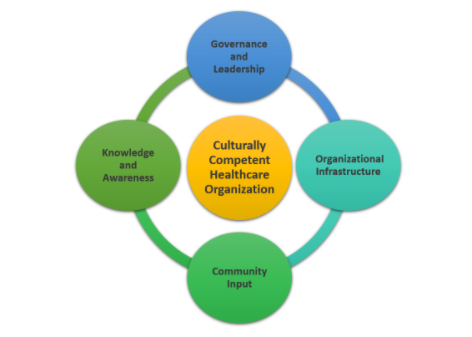The recent COVID-19 pandemic serves to underscore the growing body of evidence confirming racial and ethnic disparities in healthcare access and clinical outcomes. The Institute of Medicine Report, IOM, (2004) states that diversity among healthcare professionals is associated with improved access, provider-patient communication, and patient satisfaction. As the knowledge and understanding of these relationships grow, so does the importance of developing culturally competent healthcare organizations.
Madeleine Leininger, PhD, RN, FAAN, a leader in developing Transcultural Care Models, recognized that different cultures have different caring behaviors and different health and illness values, beliefs, and patterns of behaviors. Care is “culturally congruent and beneficial only when the clients’ patterns, expressions, and cultural values are used in appropriate and meaningful ways…”. Healthcare leaders must create culturally competent organizations and redesign more effective clinical models that address known healthcare disparities.
Read, ‘Diversity in Healthcare Leadership: Breaking the Glass Ceiling’ to review seven key elements for fostering diversity in healthcare.

6 Key Indicators of Organizational Cultural Competence
A culturally competent healthcare organization seeks to understand the culture of the population served, recognizes the impact of cultural differences, fosters internal learning opportunities to improve cultural knowledge among care teams, and modifies patient care to meet the patient’s unique needs.
1. Effective Governance: The Executive Board establishes strategic goals and policies that encourage inclusiveness and promote buy-in from diverse stakeholders. Also, diversity exists at the governance and executive leadership levels.
2. Organizational Values: The organization’s values reflect a commitment to providing culturally competent care.
3. Organizational Infrastructure: Cultural competence must be embedded in all aspects of the organization’s infrastructure from the boardroom to the bedside. Leadership and staff should reflect the diversity of the community served. Recruitment processes and promotional opportunities must be objective, fair, and equitable. Resources must be in place to support an inclusive culture and facilitate the delivery of culturally competent care.
4. Transparent Communication: The organization creates a safe place for the exchange of information among healthcare leaders, providers, staff, and patients.
5. Awareness and Education: A baseline organizational cultural competency assessment should be established and monitored to continuously assess a healthcare organization’s level of cultural competence. Programs exist to provide staff with the knowledge and skills necessary to deliver culturally competent care. Education on implicit bias should be included as part of the program.
6. Interventions & Follow-ups: An organization’s ability to deliver culturally competent clinical care requires continuous learning and ongoing communication with the community served. Strong relationships with patients and families, and openness to critical evaluation and feedback through such vehicles as a community advisory council, is essential. In addition, regular organizational self-assessments and community needs assessments are vital to understanding what changes need to be made (i.e. increased or reallocation of resources) or what new tactics should be employed to nurture organizational cultural competence.
Cultural Competency Courses for Healthcare Professionals
- Aetna cultural competency courses
- Cigna cultural competency training
- Drexel University College of Medicine cultural competency courses
Building Exceptional Healthcare Leadership Teams
Kirby Bates Associates, LLC, drives healthcare organizations to achieve high quality, cost-effective patient care through a platform of proven solutions, including Executive Search, Interim Leadership, Leadership Coaching, and Operations Consulting. We strive to bring diverse candidates to our clients to reflect their multicultural communities and enrich their healthcare delivery teams. Contact us to learn more about how we can achieve sustainable outcomes for your executive, operational, and clinical leadership teams.

